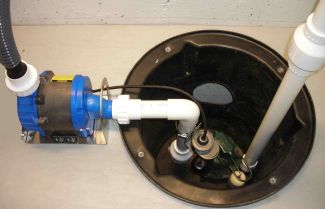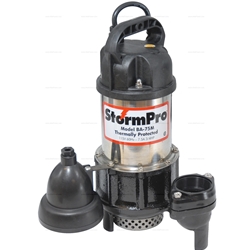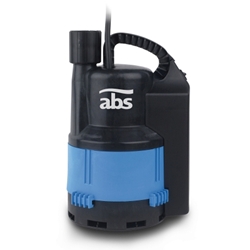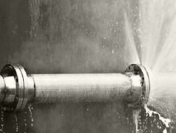If you have ever had a wet or flooded basement because the water table around your house is high or your lot has poor drainage, you may need to install a sump pump.  A sump pump is a small pump that gets installed in the lowest part of a basement or crawlspace and is used to keep the area under the house dry so it doesn’t flood. Even if your basement only floods occasionally, it may still benefit from a sump pump, especially if you frequently notice a damp or musty smell. In addition to keeping your basement dry, a sump pump will make it a healthier place and protect your flooring, walls, furniture and appliances from mildew and dampness.
Types of Sump Pumps
“Primary” sump pumps are the standard kind of pumps used in most residences. They are designed to pump seepage water out of your basement and prevent floods. Sump pumps are installed in specially constructed sump basins or pits. Water enters the sump pit through drains or by natural water migration through the soil. The sump pump’s job is to pump the water out of the pit and away from the building so the basement or crawlspace stays dry. Primary sump pumps can pump up to several thousand gallons an hour.
There are two types of primary sump pumps – pedestal pumps and submersible pumps.
- Pedestal Sump Pump — The motor on this type of pump is mounted on a shaft and positioned above your sump basin. Pedestal sump pumps are good for small basins (10†or less), as the pump base is submerged but the pump motor is not.
- Submersible Sump Pump – This type of pump has a sealed motor. The entire unit sits under the water in the sump basin. Because the motor is placed under the water, you will need a bigger pit. As long as there is enough room, submersible sump pumps are recommended for home installations because they are quieter and less obtrusive looking. They are also safer if there are children or pets in the house because the basin can be covered with a lid.
What Size Sump Pump Do You Need?
Sump pumps range in horsepower and the pumping capacity varies accordingly. Generally speaking, the higher the horsepower, the more gallons per hour it will pump. ABS Robusta sump pumps, for instance, come in ¼ HP, ⅓ HP and ½ HP.
- A â…“ HP sump pump, like the high performance Ion StormPro WC33i by Metropolitan Industries, can pump 44 gallons of wastewater per minute at 10’ levels. The â…“ HP Ion StormPro model uses a solid state sensing technology, so there are no moving parts to wear out or get hung up on in the pit which can lead to a pump failure.  A ½ HP or â…“ HP sump pump is usually adequate for most homes.Â

- If you live in an area with a high water table, flood plain or low lying area that is very susceptible to flooding, or if you have an installation with a high vertical lift (20-30 feet) and/or long horizontal run (150-250 feet), you may need a stronger ¾ HP pump like the Ion StormPro BA75i by Metropolitan Industries. This size pump will generally provide 20-25% more pumping capacity over a ½ HP sump pump, or around 75 gallons per minute.
If you are unsure what size sump pump to get for your basement, a sump pump distributor or manufacturer can help you select the right size pump for your basement.
Installation
Installing a sump pump in your basement can be a DIY project if you are handy and have the right tools. Here are step-by-step directions on how to do it and the equipment you’ll need. If you aren’t up for the task or if the construction or configuration of your basement makes installation a challenge, we suggest that you hire a plumber with sump pump experience or a basement waterproofing company. A contractor who specializes in pump installations is another option.
Importance of a Sump Pump Alarm
If for some reason your sump pump fails, you may wind up with a soggy mess in your basement. Power outages and mechanical failures are the most common reasons for a sump pump failure. Since a non-working sump pump puts your basement at serious risk of flooding, it’s a good idea to include a sump pump alarm in your system. A sump pump alarm warns you when your sump pump isn’t functioning and the water level in the sump pit is rising so you’ll have time to intervene before your basement floods.
 There are two basic kinds of sump pump alarms:
There are two basic kinds of sump pump alarms:
- “Local†Sump Pump Alarm – This type of alarm sounds a very loud audible alert that you will hear if you are in the house. The Floodfree and the Reliance Controls are examples of local sump pump alarms.
- “Remote Monitoring†Sump Pump Alarm – The type of alarm notifies you by phone, email or text message, so you will receive the warning even when you are away from home. A Sensaphone 400 hooked up to a sump bobber (a simple float switch designed to monitor the water level in a sump pump well) will call you on the phone when your sump pump isn’t working.  If you don’t have a landline phone at your location or would rather receive text message alerts, the PumpAlarm Cellular Water Alarm communicates via a cellular connection.
Prepare Now Before Spring Thaws and Storms
In most northern areas of the country, March and April bring melting snow and heavy rains, leading to wet and flooded basements. If your property has poor drainage and the water table around your house is high, now is the time to install a sump pump system before the spring thaws arrive and the ground becomes over saturated.
In addition to equipping your sump pump with a sump pump alarm, consider also adding a battery-powered backup system that will continue to pump water in the event of a power outage or equipment failure. For advice on what type of sump pump is best for your basement, call the experts at diycontrols.com at 1-800- 487-1363.






